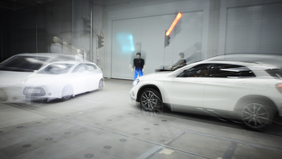The SAVE-ROAD research project of Technische Hochschule Ingolstadt (THI) to increase road safety is being funded by the Bavarian Research Foundation with around 658,000 euros. This makes the project one of four Bavaria-wide projects selected by the Board of Trustees of the Bavarian Research Foundation in the first funding round in 2020.
The research project, which will be implemented over the next three years together with the industrial partners EFS in Gaimersheim (technology provider for software in the field of assisted and piloted driving) and PCO AG (development and production of high-end camera systems), aims to be able to safely predict the severity of traffic accidents with the aid of artificial intelligence and machine learning. The focus here is on suddenly appearing objects in the vehicle environment and robust prediction under various environmental conditions. This reliable detection with drastically reduced reaction time is to serve as the basis for the activation of suitable safety systems such as airbags.
Suddenly appearing and partially concealed objects in the vehicle environment, such as a child chasing a ball, or concealed vehicles, present algorithms with great challenges. An increase in automated driving functions therefore requires seamless monitoring of the immediate vehicle environment, especially in populated areas. Information with a high degree of accuracy on the sequence and intensity of an impending accident helps to gain decisive milliseconds for the activation of safety systems in the run-up to an unavoidable accident, thus providing even better protection for vehicle occupants.
In the SAVE-ROAD research project, the scientists are developing a system based on artificial intelligence and machine learning for recording the vehicle environment using sensor data fusion. For this purpose, the researchers are merging data from high-resolution radars and optical systems, taking into account accident-relevant parameters such as type of object, speed or distance. The sensor technologies combined in this way are to be validated as part of a novel monitoring concept that makes safety-relevant decisions based on data quality and controls the activation of protective systems. The researchers are paying particular attention to reliable detection under different environmental conditions such as rain, fog or unfavourable lighting conditions, which make reliable detection considerably more difficult.
The research project is headed by Prof. Dr. Thomas Brandmeier, Scientific Director of the CARISSMA Research and Test Centre at THI, and Prof. Dr. Alessandro Zimmer, Professor specialising in computer vision, image processing and artificial intelligence in CARISSMA.


![[Translate to English:] Logo Akkreditierungsrat: Systemakkreditiert](/fileadmin/_processed_/2/8/csm_AR-Siegel_Systemakkreditierung_bc4ea3377d.webp)








![[Translate to English:] Logo IHK Ausbildungsbetrieb 2023](/fileadmin/_processed_/6/0/csm_IHK_Ausbildungsbetrieb_digital_2023_6850f47537.webp)


